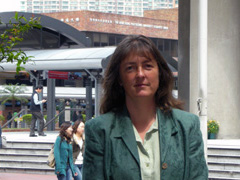
Professor Adele Ladkin, Professor and Associate Dean (Administration), Hong Kong Polytechnic University
Professor Adele Ladkin has just returned from two years in Hong Kong, where she worked as Professor and Associate Dean (Administration) in the School of Hotel and Tourism Management (SHTM) at the Hong Kong Polytechnic University (HKPU). She is presently Professor of Tourism Employment in the School of Tourism at Bournemouth University.
Adele holds a first degree in Geography and an MSc in Tourism Management. Her PhD involved research into human resources in the hospitality industry. Adele worked at the Universities of Brighton and Surrey as a lecturer before joining Bournemouth University in 1998. Adele is an expert on tourism education, employment and labour issues in the industry.
She spoke to Sarah Marten about her exciting time spent working in Hong Kong, where university teaching takes place in English.
A varied role in Hong Kong
Adele’s role in Hong Kong was a mix of administration, teaching and research, with a strong emphasis on administration. The teaching involved about three hours a week in the classroom, working with students following the MSc in Hotel and Tourism Management and the Doctorate in Hotel and Tourism Management.
“Teaching work, both in the classroom and all the necessary preparation occupied about one day a week of my time. As Associate Dean I was heavily involved in various committees, including the development of new programmes and quality assurance across the school. There were over 2000 students and 60 academics so life was always busy, and hospitality courses are very popular in Hong Kong, where the hotel industry is thriving and much more visible than in the UK. Education generally is highly valued and so I had a level of respect that I had not experienced before.”
As well as looking after teaching and learning Adele also managed the staff development scheme and supervised five students who were working towards higher degrees. At the same time she continued with her own academic research into occupational identity in the hospitality industry. This involved interviewing hotel managers, exploring the issues around their work.
A high-ranking university
SHTM at HKPU has a good reputation and is ranked number two in the world for research. Adele had not really considered working abroad, but when the opportunity arose she readily embraced it.
“I had visited HKPU a couple of years before as a visiting professor during a summer vacation. I got to know the academics and liked both the university and the school. I didn’t hesitate when I saw a job offering a two year contract there, and submitted my application. Permanent positions are rarely offered initially – most HKPU staff are employed on two or three year contracts. Obtaining my visa was extremely straightforward and HKPU assisted with this process, which only took three weeks. My husband accompanied me to Hong Kong on a dependent’s visa, which was also organised by the university.”
Adele did not get any assistance from the university in finding somewhere to live. For the first month she lived in a hotel and then rented a small one bedroom flat. Hong Kong rents are astronomical, and the university helped with a housing allowance in addition to Adele’s salary.
A smooth transition

Having found suitable accommodation near the university, Adele quickly adjusted to a new routine and a very different climate!
“Luckily I like hot weather and can cope with the extreme humidity experienced in Hong Kong for several months each year. My students were a mix of local Hong Kong, mainland Chinese and International. I found the students to be delightful – very hardworking, dedicated and overall extremely nice people. In the UK I had been used to teaching international students, so the transition was quite straightforward.
“Education in China tends to be quite formal and students are not used to challenging anyone in authority, including university lecturers! I wanted to use more active methods of teaching, which was enabled simply by re-arranging the furniture and encouraging the students to work in small groups”.
Work progressed happily for Adele as soon as she arrived in Hong Kong, and she found her colleagues to be friendly and supportive. Colleagues invited her out for meals at local restaurants, and Adele developed an open-minded attitude towards some of the items on the menu.
“Accepting hospitality in Hong Kong is really important, and although the food was sometimes unusual, it would be inhospitable to decline. So when snake soup was offered to me, I consumed this without complaint! I loved living in Hong Kong – it is such a vibrant place where east literally meets west. The city is open and forward-looking, but there is still evidence of Chinese tradition. The public transport is excellent and it is a very safe place in which to live.
“Hong Kong is, however, very densely populated and the sounds from traffic and people can sometimes be overbearing. Our rented flat was tiny, and in the end this was the main reason why I decided to return to the UK.”
Higher education in Hong Kong is very well-funded, organised and managed. Historically the universities followed the British model, offering three year degrees. The HE sector is currently undergoing significant change, with the implementation of four year degree programmes and changes in the secondary school education, taking effect from 2012.
“The level of professionalism at the university was impressive, and I felt really valued in my work there. English is very much a common language, whilst the local language, Cantonese, is extremely difficult to learn. So although speaking Cantonese would have been a huge advantage, this was never going to be a reality for me. I therefore missed out on some cultural events and the opportunity to communicate with people in their own language.”
An opportunity not to be missed
Adele feels that her time in Hong Kong provided her with some invaluable experiences – not only to experience a new country and culture but to maintain links with her overseas colleagues.
“I now have a much better understanding of my Asian students here in the UK. The links I developed with academic staff in SHTM are worth their weight in gold. Our collaboration over research will continue, and I am also flying back to Hong Kong shortly to participate in a tourism research conference. My advice to anyone is this: if you have the opportunity to work in Hong Kong then take it. Visit before you accept the post, as it is unbelievably busy, and that might not be for you. But I loved my time working at HKPU, and would recommend the experience to anyone.”




Leave a Reply